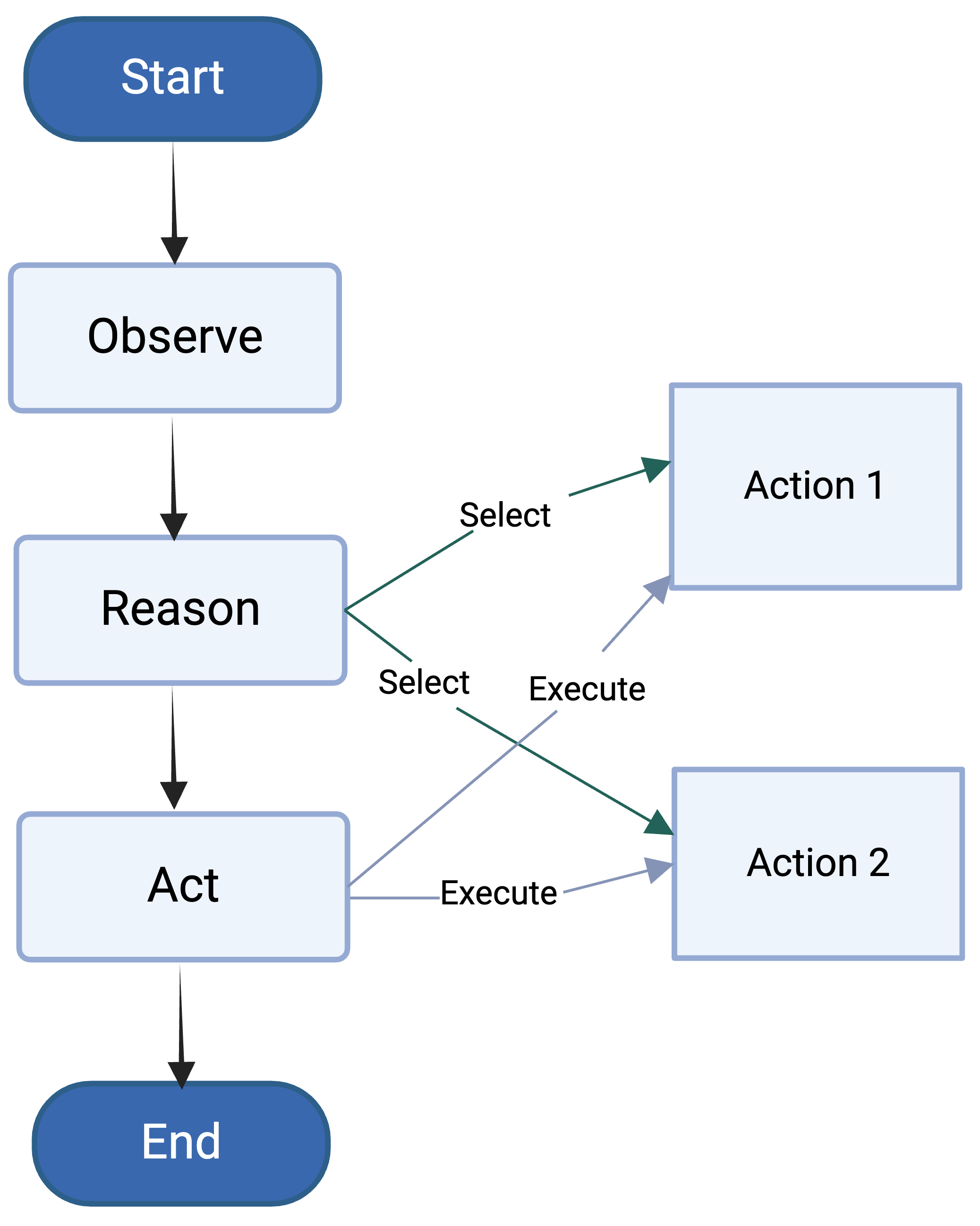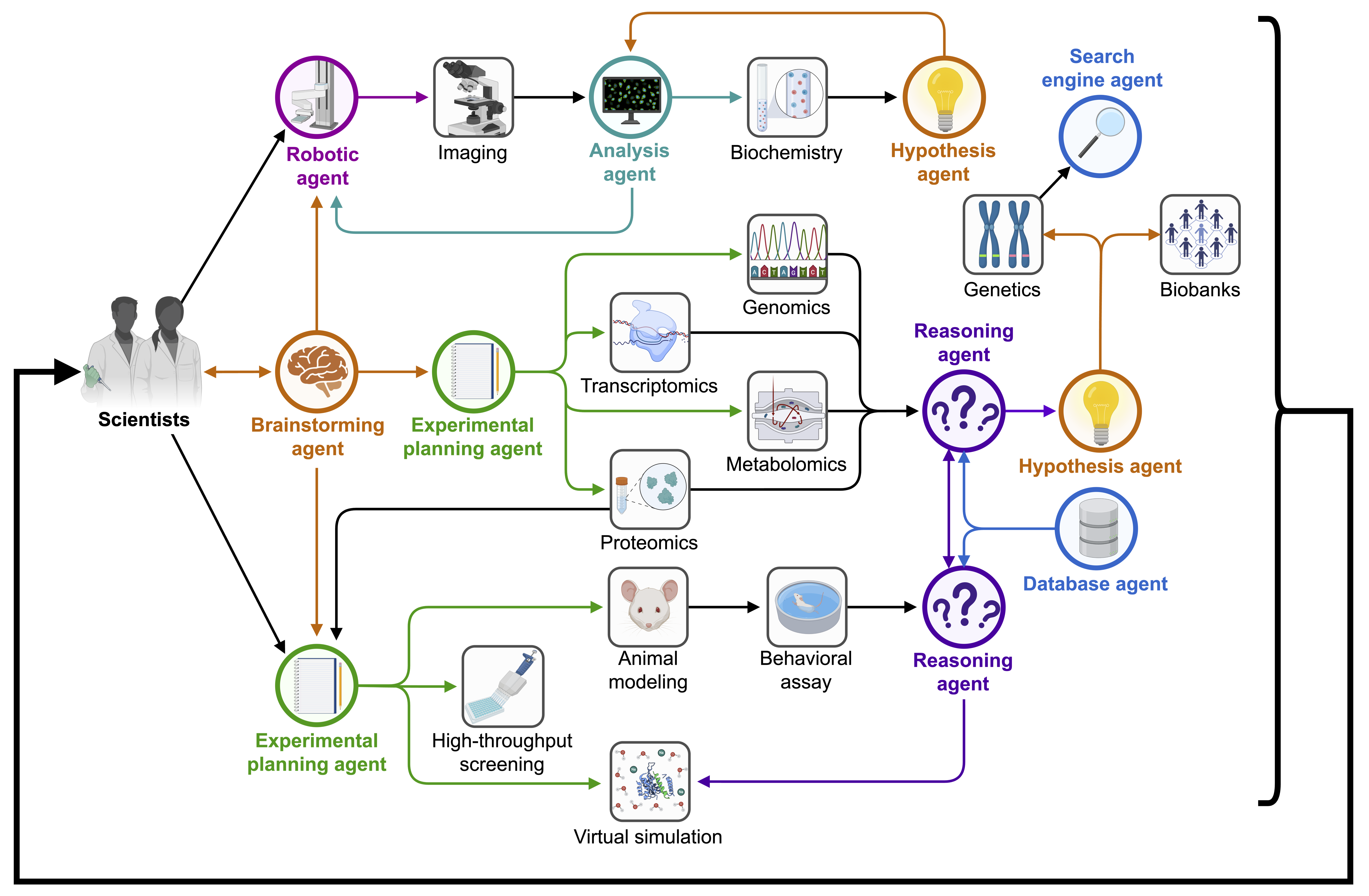Leveraging Multi-AI Agents for Cross-Domain Knowledge Discovery
2404.08511

0
0

Abstract
In the rapidly evolving field of artificial intelligence, the ability to harness and integrate knowledge across various domains stands as a paramount challenge and opportunity. This study introduces a novel approach to cross-domain knowledge discovery through the deployment of multi-AI agents, each specialized in distinct knowledge domains. These AI agents, designed to function as domain-specific experts, collaborate in a unified framework to synthesize and provide comprehensive insights that transcend the limitations of single-domain expertise. By facilitating seamless interaction among these agents, our platform aims to leverage the unique strengths and perspectives of each, thereby enhancing the process of knowledge discovery and decision-making. We present a comparative analysis of the different multi-agent workflow scenarios evaluating their performance in terms of efficiency, accuracy, and the breadth of knowledge integration. Through a series of experiments involving complex, interdisciplinary queries, our findings demonstrate the superior capability of domain specific multi-AI agent system in identifying and bridging knowledge gaps. This research not only underscores the significance of collaborative AI in driving innovation but also sets the stage for future advancements in AI-driven, cross-disciplinary research and application. Our methods were evaluated on a small pilot data and it showed a trend we expected, if we increase the amount of data we custom train the agents, the trend is expected to be more smooth.
Create account to get full access
Overview
- The paper explores the use of multiple AI agents to facilitate cross-domain knowledge discovery.
- It proposes an agent architecture that enables collaboration and information exchange between agents specializing in different domains.
- The goal is to harness the complementary strengths of these agents to uncover new insights and connections that may not be apparent within a single domain.
Plain English Explanation
The paper discusses a way to use multiple specialized AI systems, or "agents," to help expand our understanding across different fields of study. The key idea is to have these AI agents work together, sharing information and insights, rather than having them operate in isolation within their own domains.
For example, imagine you have one AI agent that specializes in biology and another that specializes in economics. By having these two agents collaborate, they may be able to uncover connections between biological processes and economic trends that a single agent might have missed. The Empowering Biomedical Discovery with AI Agents paper explores a similar concept in the context of biomedical research.
The key benefit of this approach is that it allows the AI systems to leverage their specialized knowledge in novel ways, leading to the discovery of insights that would be difficult for a human researcher to uncover on their own. This could be particularly useful in advancing the search frontier and enhancing research information systems.
Technical Explanation
The paper proposes an agent architecture that enables collaboration and information exchange between AI agents specializing in different domains. Each agent is designed to excel in a particular field, such as biology, economics, or materials science, and they are able to communicate with one another to share insights and discoveries.
The core components of the agent architecture include:
- Knowledge Representation: Each agent maintains a structured knowledge base that captures the key concepts, relationships, and data relevant to its domain of expertise.
- Reasoning Engines: The agents employ specialized reasoning mechanisms, such as machine learning models or rule-based systems, to analyze data and generate new hypotheses within their respective domains.
- Communication Interfaces: The agents are equipped with the ability to exchange information, query each other's knowledge bases, and collaborate on joint tasks or problem-solving efforts.
By leveraging this multi-agent framework, the researchers aim to enable autonomous evaluation and refinement of digital agents and facilitate the discovery of cross-domain connections that may lead to novel scientific insights or technological advancements. The Autonomous Artificial Intelligence Agents for Clinical Decision Making paper explores a similar concept in the context of healthcare.
Critical Analysis
The proposed approach has several potential benefits, such as the ability to uncover previously unknown connections across different fields and the potential to accelerate the pace of scientific discovery. However, the paper also acknowledges several challenges and limitations that need to be addressed.
One key challenge is the complexity of coordinating and managing the interactions between multiple specialized agents, as well as ensuring the consistency and reliability of the information they exchange. There are also concerns about the potential for biases or errors to propagate through the system, which could lead to the generation of incorrect or misleading insights.
Additionally, the paper does not provide a detailed evaluation of the proposed architecture, and it would be useful to see empirical evidence of its effectiveness in real-world scenarios. Further research is needed to explore the scalability of the approach, as well as its applicability to a wider range of domains beyond the examples provided in the paper.
Conclusion
The paper presents a novel approach to leveraging multiple AI agents for cross-domain knowledge discovery. By enabling these specialized agents to collaborate and share information, the researchers aim to uncover insights and connections that may not be readily apparent within a single domain.
While the proposed architecture shows promise, there are several technical and practical challenges that need to be addressed. Ongoing research and development in this area could lead to significant advancements in enhancing research information systems and autonomous evaluation and refinement of digital agents, ultimately contributing to the acceleration of scientific progress and technological innovation.
This summary was produced with help from an AI and may contain inaccuracies - check out the links to read the original source documents!
Related Papers

Empowering Biomedical Discovery with AI Agents
Shanghua Gao, Ada Fang, Yepeng Huang, Valentina Giunchiglia, Ayush Noori, Jonathan Richard Schwarz, Yasha Ektefaie, Jovana Kondic, Marinka Zitnik

0
0
We envision 'AI scientists' as systems capable of skeptical learning and reasoning that empower biomedical research through collaborative agents that integrate machine learning tools with experimental platforms. Rather than taking humans out of the discovery process, biomedical AI agents combine human creativity and expertise with AI's ability to analyze large datasets, navigate hypothesis spaces, and execute repetitive tasks. AI agents are proficient in a variety of tasks, including self-assessment and planning of discovery workflows. These agents use large language models and generative models to feature structured memory for continual learning and use machine learning tools to incorporate scientific knowledge, biological principles, and theories. AI agents can impact areas ranging from hybrid cell simulation, programmable control of phenotypes, and the design of cellular circuits to the development of new therapies.
4/4/2024

Knowledge Transfer for Cross-Domain Reinforcement Learning: A Systematic Review
Sergio A. Serrano, Jose Martinez-Carranza, L. Enrique Sucar

0
0
Reinforcement Learning (RL) provides a framework in which agents can be trained, via trial and error, to solve complex decision-making problems. Learning with little supervision causes RL methods to require large amounts of data, which renders them too expensive for many applications (e.g. robotics). By reusing knowledge from a different task, knowledge transfer methods present an alternative to reduce the training time in RL. Given how severe data scarcity can be, there has been a growing interest for methods capable of transferring knowledge across different domains (i.e. problems with different representation) due to the flexibility they offer. This review presents a unifying analysis of methods focused on transferring knowledge across different domains. Through a taxonomy based on a transfer-approach categorization, and a characterization of works based on their data-assumption requirements, the objectives of this article are to 1) provide a comprehensive and systematic revision of knowledge transfer methods for the cross-domain RL setting, 2) categorize and characterize these methods to provide an analysis based on relevant features such as their transfer approach and data requirements, and 3) discuss the main challenges regarding cross-domain knowledge transfer, as well as ideas of future directions worth exploring to address these problems.
4/30/2024
✅
Development of an Adaptive Multi-Domain Artificial Intelligence System Built using Machine Learning and Expert Systems Technologies
Jeremy Straub

0
0
Producing an artificial general intelligence (AGI) has been an elusive goal in artificial intelligence (AI) research for some time. An AGI would have the capability, like a human, to be exposed to a new problem domain, learn about it and then use reasoning processes to make decisions. While AI techniques have been used across a wide variety of problem domains, an AGI would require an AI that could reason beyond its programming and training. This paper presents a small step towards producing an AGI. It describes a mechanism for an AI to learn about and develop reasoning pathways to make decisions in an a priori unknown domain. It combines a classical AI technique, the expert system, with a its modern adaptation - the gradient descent trained expert system (GDTES) - and utilizes generative artificial intelligence (GAI) to create a network and training data set for this system. These can be created from available sources or may draw upon knowledge incorporated in a GAI's own pre-trained model. The learning process in GDTES is used to optimize the AI's decision-making. While this approach does not meet the standards that many have defined for an AGI, it provides a somewhat similar capability, albeit one which requires a learning process before use.
6/18/2024

New!BMW Agents -- A Framework For Task Automation Through Multi-agent Collaboration
Noel Crawford, Edward B. Duffy, Iman Evazzade, Torsten Foehr, Gregory Robbins, Debbrata Kumar Saha, Jiya Varma, Marcin Ziolkowski

0
0
Autonomous agents driven by Large Language Models (LLMs) offer enormous potential for automation. Early proof of this technology can be found in various demonstrations of agents solving complex tasks, interacting with external systems to augment their knowledge, and triggering actions. In particular, workflows involving multiple agents solving complex tasks in a collaborative fashion exemplify their capacity to operate in less strict and less well-defined environments. Thus, a multi-agent approach has great potential for serving as a backbone in many industrial applications, ranging from complex knowledge retrieval systems to next generation robotic process automation. Given the reasoning abilities within the current generation of LLMs, complex processes require a multi-step approach that includes a plan of well-defined and modular tasks. Depending on the level of complexity, these tasks can be executed either by a single agent or a group of agents. In this work, we focus on designing a flexible agent engineering framework with careful attention to planning and execution, capable of handling complex use case applications across various domains. The proposed framework provides reliability in industrial applications and presents techniques to ensure a scalable, flexible, and collaborative workflow for multiple autonomous agents working together towards solving tasks.
7/1/2024